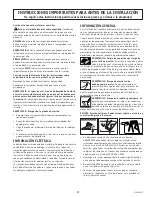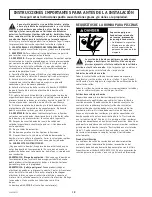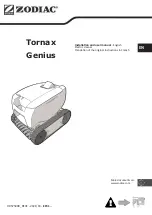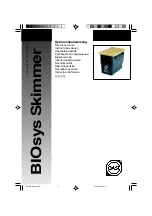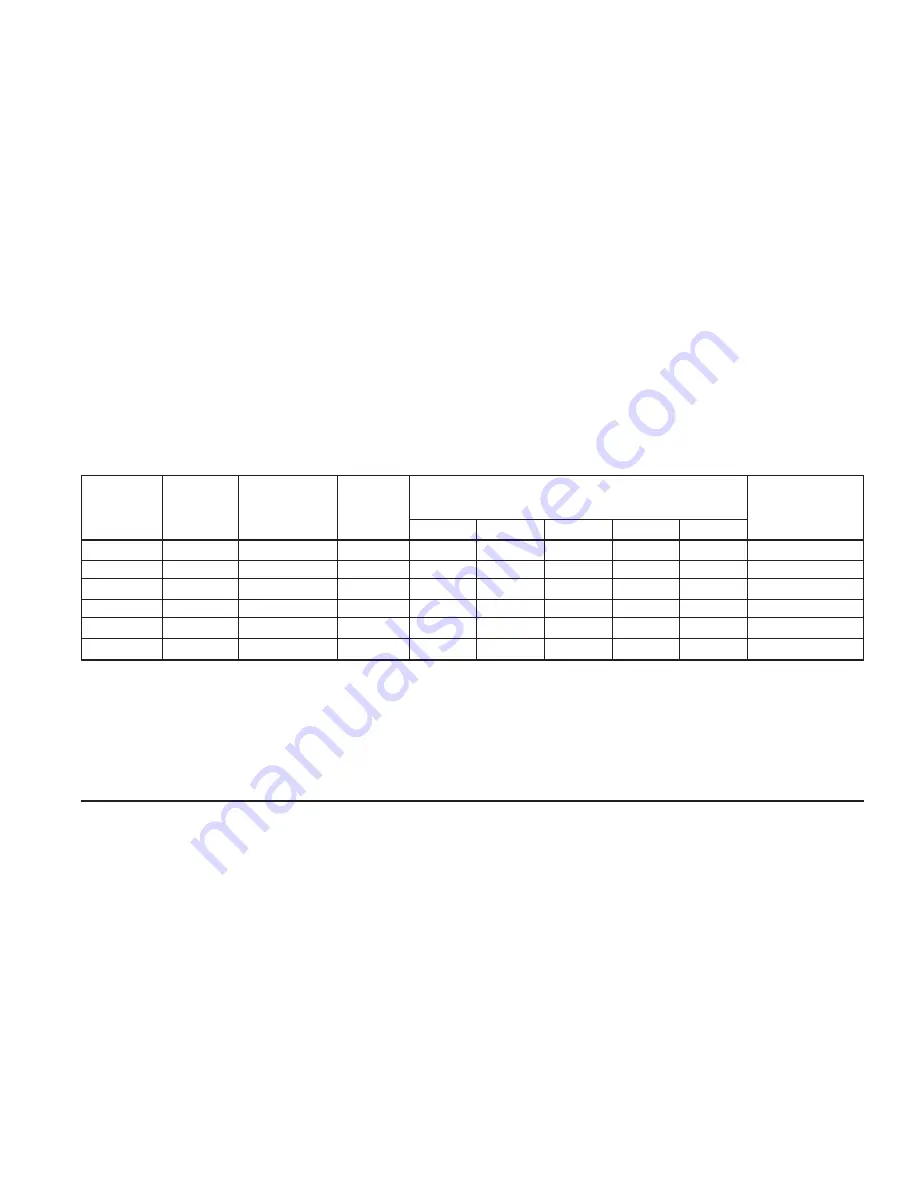
5
23833A157
ELECTRICAL INFORMATION
Installation Instructions
Wiring to this pump must be installed and maintained in
accordance with the National Electric Code, state and local codes.
If more information is needed, call your local licensed electrician
or your power company.
Grounding the Motor:
Permanently ground the motor in
accordance with the National Electric Code Article 250 and
applicable local codes and ordinances. It is recommended that
permanent ground connection be made to the unit using a
conductor no smaller than No. 8 AWG (8.4 mm
2
). This ground
conductor should be connected from the accessible wire connector
on the motor to all metal parts of the swimming pool structure
and to all electrical equipment, metal conduit, and metal piping
within 5 feet (1.5 m) of the inside walls of a swimming pool, when
the motor is installed within 5 feet of the inside walls of the
swimming pool. This permanent ground should be from a metal
underground water pipe or a grounded lead in the service panel. A
metal underground water pipe or well casing at least 10 feet long
makes the best ground electrode.
If plastic pipe or insulated fittings are used, run the ground wire
directly to the ground electrode furnished by the power company.
Caution:
Do not ground to a gas supply line and do not connect
to an electric power supply until unit is permanently grounded.
Connect the ground wire to the approved ground and then connect
to the terminal provided.
Important:
For your safety, be sure electrical circuit to pump is
shut off (disconnected) before attempting to wire pump. Pump
should be connected to a separate electrical circuit directly from
main switch. A fuse box or circuit breaker must be used in this
line (see fuse chart). Plugging into existing outlets can cause
low voltage at motor, resulting in blown fuses, tripping of motor
overload, or burned-out motor. All wiring must follow local codes.
Note: If ever in doubt, call a licensed electrician.
Motor Voltage:
The pumps are wired for 230 volts, but may
be converted to 115 volts by referring to instructions printed
on motor. If motor is converted to 115 volts, have a qualified
electrician check the entire electrical and power leads system to
be sure they can handle the higher amps.
To Wire Pump:
Make electrical connections with ground. First
connect bare copper ground to ground screw on back of motor.
Next make power connections.(See chart for wire size.)
NAME-
FUSE OR
PUMP
MOTOR
PLATE
MAX. WIRE LENGTH USING AWG WIRE SIZE
CIRCUIT
MODEL
HP
VOLTAGE
AMPS
14
12
10
8
6
RSP7
BREAKER
3/4
115
11.8
100
160
250
385
600
RSP7
15
3/4
230
5.9
400
630
990
1545
2405
RSP10
10
1
115
14.4
—
128
200
310
485
RSP10
20
1
230
7.2
300
475
660
1030
1650
RSP15
10
1-1/2
115
20.8
—
—
142
222
345
RSP15
25
1-1/2
230
10.4
220
350
545
860
1325
15
SWIMMING POOL WIRE & FUSE SELECTION CHART
MAINTENANCE AND SERVICE
Priming the Pump
To prime the pump, remove the lid from the strainer and fill the
pump and basket with water. Turn cover counterclockwise to
remove.
CAUTION: Be sure pump has been shut off and pressure
relieved before removing cover.
In areas where freezing temperatures occur, protect pump and
pipes from freezing. When water freezes, it expands and damages
the pump and piping.
WARNING. Do not use commonly available antifreeze solutions.
Automotive antifreeze solutions are commonly made up of
ethylene glycol, which is highly poisonous and does not evaporate.
Methyl alcohol is also highly poisonous, but will evaporate if given
enough exposure to the atmosphere. Many windshield washer
solutions are compounded with methylhydrate, which is very
poisonous. All of these above-mentioned antifreezes have a strong
deteriorating effect on some plastic materials commonly found in
pool pumps, valves, and filter components. Some plastics, such as
those used in pump impellers, will become crystalline and brittle
when in contact with antifreeze solutions or are exposed to the
fumes. Other materials, such as clear trap lids can become milky in
appearance, soften or lose rigidity when exposed to the fumes of
antifreeze compounds.
When basket and pump are filled with water, replace strainer lid.
Lubricate O-ring each time with petroleum jelly. Be sure O-ring
seal is in place before tightening cover. Turn clockwise to tighten.
The pump will now prime, with the priming time depending on the
suction lift and the horizontal distance of the suction piping.
POOL WINTERIZING
The recommended procedures for winterizing pool piping
are as follows:
1.
Use
low pressure air flow
to blow accumulated water from
the piping system after the water level has been pumped down
below all inlets to the pool. Drained inlet piping may be capped to
prevent re-entry of water into the pipes.
2.
There is one antifreeze solution that is compatible with
plastics and is nontoxic. Preliminary investigations show that
DOWFROST
TM
, a product of Dow Chemical Company, is
safe and
effective
for use in pools and all types of fresh water piping
systems for winterizing, including solar systems. It is compounded
of propyleneglycol, and has a very low evaporation rate.
A solution of 40% Dowfrost and 60% water will protect pipes from
bursting to –50° F. A unique property of Dowfrost is that it contracts
as it approaches its freezing point, counteracting the expansion
characteristics of water and preventing bursting of pipes.

















